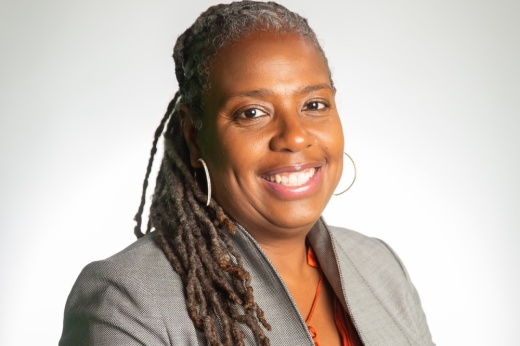Harris County Public Health is the health department for Harris County that provides comprehensive health services and programs to the community. The mission of the organization—made up of approximately 700 public health professionals—is to promote health and well-being by advancing equity, building partnerships and establishing culturally responsive systems.
Robinson spoke with Community Impact to discuss new initiatives and health trends for the upcoming year. The following interview with Robinson has been edited for length and clarity.
What message about overall health and well-being would you like to share with readers at the start of this year?
Although this is the beginning of a new year, this is still cold and flu season. In addition, nationally, we have seen a rise in respiratory infections, including respiratory syncytial virus, or RSV. I would like to encourage community members to stay alert and watchful for any common signs and symptoms. It is important that they consult their primary care physician or a provider and receive the appropriate testing if they are experiencing signs or symptoms. Testing allows for appropriate diagnosis and treatment.
The other message I have for all community members is to be mindful of their health and well-being by visiting their primary care physician or provider and staying up to date with preventive screenings, check-ups and vaccinations. If they do not have a primary care physician and live within Harris County, we have resources that can help. Community members can visit our website, publichealth.harriscountytx.gov for more details.
What are some of the initiatives that residents can expect from the HCPH in the upcoming year?
In the new year, HCPH is working to expand our violence prevention services. Our Community Health and Violence Prevention Services Division uses public health approaches to prevent violence in Harris County and is comprised of two programs—the Holistic Assistance Response Team pilot program and the Relentless Interrupters Serving Everyone program, formerly known as the Community and Hospital violence prevention programs.
HART utilizes a public health approach when responding to calls for services traditionally routed to law enforcement. In collaboration with the Accessing Coordinated Care and Empowering Self Sufficiency Harris County program, which is a holistic, person-centered model of care, HART increased the availability of resources to Harris County jurisdictions. HART reduces the burden on law enforcement by dispatching a team made up of a crisis intervention specialist and a certified emergency medical technician to non-violent 911 calls to address behavioral health and social welfare concerns. As of February, HART has responded to over 8,000 calls between the two districts since launching in March 2022.
RISE is a community-based solution to reducing gun violence using a public health approach that operates outside and is complementary to law enforcement. This program utilizes credible messengers to interrupt violence and defuse immediate tensions in an effort to help build long-term peace while creating a safer community for everyone. This is achieved by employing community members who have had similar life experiences to those at the highest risk of committing acts of violence or becoming a victim of violence.
This year, we are also starting the Uplift Harris Guaranteed Income Pilot Program to support low-income families in high-poverty ZIP codes in the county. The Uplift Harris Pilot is the fifth largest publicly funded cash assistance project in the United States and the county’s first guaranteed income program. The initiative launched this month and will distribute $500 per month to over 1,900 eligible households for 18 months. Through this program, we hope to achieve increased housing stability for individuals and families [and] increased employment and address other social determinants of health outcomes.
In the county’s latest health disparities report, HCPH officials addressed how certain racial and ethnic minority groups experience higher rates of poor health conditions. Why is it important to provide increased access to services and programs for residents who have historically been underserved or lacked access to such services?
HCPH is working to refine existing services and develop new programming to better assist community members in Harris County. All HCPH programs are planned using a data-driven and equitable approach, prioritizing geographic equity and accessibility for those who require our services the most.
In order to enhance the health outcomes in Harris County, it is essential to strengthen access to services and programs for residents who have historically lacked access or have been underserved. This will help eliminate the health and well-being disparities they are currently facing. We must recognize that an individual’s health extends beyond behavioral factors, including clinical care, social and economic factors, and physical environments.
Harris County has one of the highest measures of adverse health, economic, and social outcomes due to COVID-19. Many, if not all, HCPH programs observed significant setbacks in their service delivery and goals. The lessons learned proved to be an opportunity for more significant work and reach of services. It is now more important than ever to work towards health equity as the pandemic exposed and worsened existing healthcare access and outcomes inequalities. The main goal of the Health Disparities Annual Report is to reduce disparities in access to services in order to improve health outcomes and provide information on equitable programs and services provided by HCPH.
Some of the services and programs HCPH offers to help reduce these disparities include the Tobacco Cessation Program addresses health disparities by focusing on helping people in zip codes where services are most needed. The program’s main goal is to raise awareness of the danger of nicotine use, including smoking and/or vaping, through education, offering group sessions to help them quit, and referring Harris County residents to other partner organizations that provide free services to educate the public on the dangers of nicotine use.
The Nutrition and Physical Activity Program uses an evidence-based curriculum to teach people of all ages about healthy eating and exercising. The team partners with schools, community centers, and after-school programs, among other community settings in Harris County, to encourage people to live healthy lifestyles. The nutrition sessions are also designed to be sensitive to cultures and ensure they are appropriate for the targeted audience.
HCPH Integrated Mobile Health Services offers various free and/or low-cost preventive and chronic care health services such as vaccinations (COVID-19, Mpox, and Influenza), health screening, HIV testing, chronic disease prevention and management and tobacco cessation. These services are provided strategically in areas of high need, such as those with high social vulnerability index. HCPH provides Integrated Mobile Health Services at brick-and-mortar locations and community events across Harris County.
The HCPH Maternal and Child Health Program (MCHP) aims to support pregnant individuals in building a healthy foundation for their families. The MCHP determines target populations by focusing on uninsured, underinsured, social vulnerability index, health deserts, access to care data and state morbidity/mortality reports.
As part of the health literacy portfolio, HCPH is working diligently to create and establish a Maternal Health Bill of Rights to increase awareness for birthing persons, medical providers and community partners that support birthing persons. The Maternal Health Bill of Rights aims to move the needle in addressing the public health crisis of maternal and infant mortality. We know the Maternal Health Bill of Rights will go a long way in educating, informing and helping birthing persons advocate for themselves to improve health outcomes.
What is it like overseeing an organization tasked with improving the health and well-being of Harris County residents?
Our public health professionals' role is essential to carrying out our mission to create a healthier, safer and more inclusive community for all who live, work, worship and play in Harris County. It is phenomenal to reflect on where we were nearly three years ago when I first began my role as Executive Director of Harris County Public Health and to see the incredible people who have come to the department to create a Harris County in which all people can achieve their full potential for health and well-being. Working with my colleagues to introduce more effective and just strategies for tackling human and public health issues in our communities is so gratifying.
It is important to emphasize that we cannot do this work alone. Our work with community partners advances our vision to promote the health and well-being of all Harris County community members.





